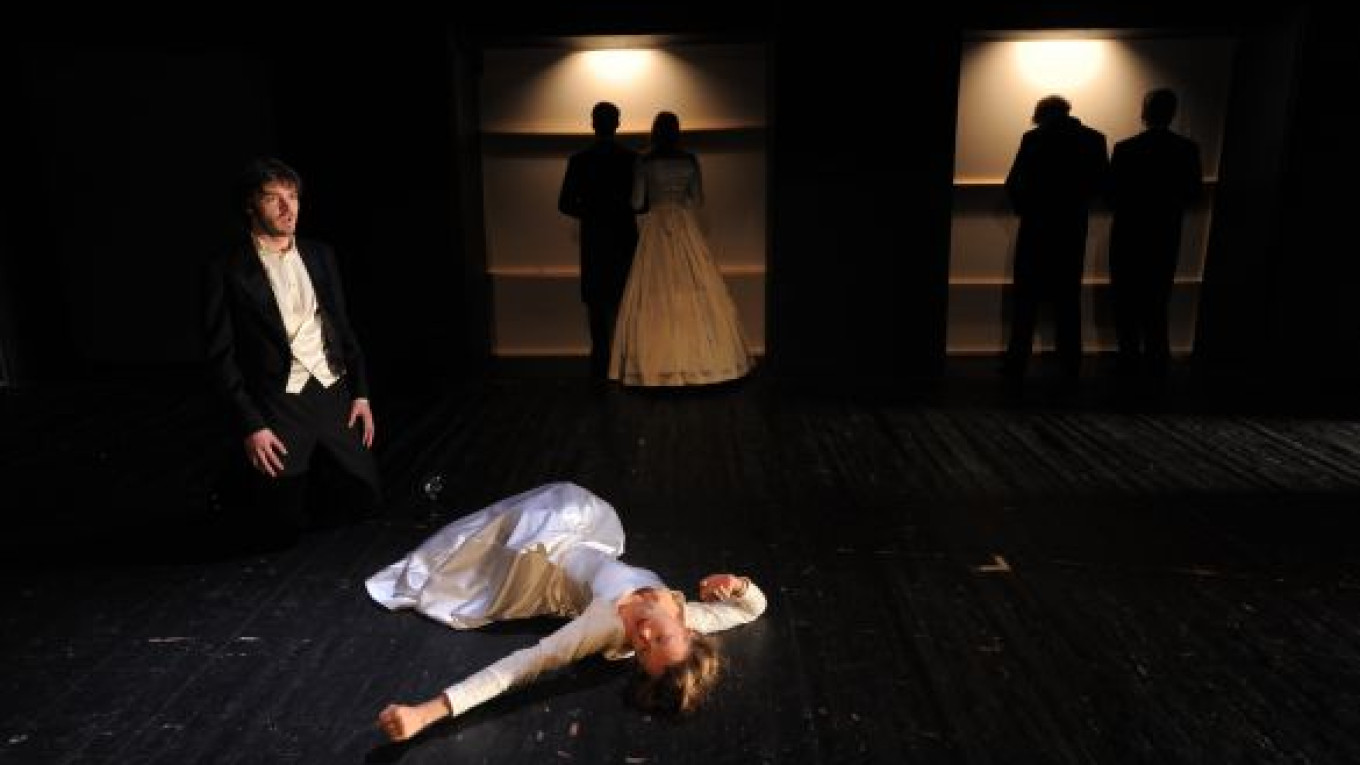Theater is often a matter of a glass half-full or a glass half-empty. In the case of "Don Juan. A Version," as directed by newcomer Andrei Shlyapin on the small stage at the Mossoviet Theater, the half-full glass is a lot bigger.
As we learn during one of this show's many eclectic and often funny scenes, the Don Juan myth may be the most popular we have. At one point a young man takes a seat at center stage, pulls out his iPad and begins reading a list of works written on the topic. Starting in the 17th century, it balloons in the 19th and 20th centuries. The actor is still ticking off new titles as two other actors escort him from the stage.
Shlyapin took five of these pieces — by Alexander Pushkin, Moliere, E.T.A. Hoffman, Konstantin Balmont and Mozart — and scrunched them into a single show. He doesn't pursue a single plot, although he massages the basic story throughout — Don Juan and his servant making their way around Madrid in search of women inspiring love, and in flight, as the text here says repeatedly, from a "dozen riders" who would track them down and do them harm.
Through the centuries the myth has been perceived variously as a morality tale, a philosophical tale and a romance. In Shlyapin's hands it's a little of each, as three different Juans play out discrete scenes with an assortment of servants, lovers, adversaries and passers-by. Anton Anosov plays the youthful, happy-go-lucky hero; Rustam Akhmadeyev plays a more mature, compromised figure; and, in a powerful single scene, Vitaly Kishchenko plays the harshest, most jaded version of all while also handling a sarcastic interpretation of Juan's one possible true love, Donna Anna.
The tone of this production is set by Andrei Smirnov in the role of Juan's servant Sganarelle, taken from Moliere's "Don Juan, or the Feast with the Statue." He is hard, unforgiving and certain of his moral superiority over his master. In deadly serious lectures delivered as stand-up comic routines, he slowly picks away at Juan's most vulnerable aspect, his belief in his innocence. Indeed, the stage is often littered with bloodied bodies left behind by the Great Lover.
Condemnation is brought down on Juan's head hardest by his father Don Louis. In what amounts to a short, one-man show, Anatoly Adoskin delivers a harsh reproach not only to his son, but to anyone within earshot of his rant about the degradation of society. That is, this speech delivered on an empty stage by one man is aimed directly at those of us sitting in the audience. Adoskin cleverly challenges us to consider the question, are we worthy of our grandfathers' fame?
Lest it be thought that Shlyapin merely piles rebuke on Don Juan, a scene involving Juan's former lover Laura reveals how truly this man touches the women in his life.
Hosting a stylish party at her home, Laura (Vilma Kutaviciute) taunts her latest lover Don Carlos (Alexei Trofimov) by singing a song written by Juan. Employing karaoke, live vocals and some warbling call and response with Anosov's boyish Juan, Laura paints a funny, but primarily sensuous and heartfelt picture of her deep attachment to Don Juan.
As I hinted earlier — the half-full, half-empty notion — this episodic performance does not always hold together. At times it seems repetitive, at other times it lurches forward without connection to what has come before.
What it usually does well, however, is frame some of the key questions we have distilled about Don Juan over the ages. Is he a lover or a fighter? Is he a man of the spirit or is he a heretic? These questions are asked and answered over and over in various ways, providing something of a stereophonic approach to them. By frequently pulling scenes, monologues and individual phrases out of the usual context, Shlyapin encourages us to hear them in new and intriguing ways.
Alexandra Dashevskaya's set matches the production's eccentricity, although the basis is always an empty black box. Working from nothing, as it were, Dashevskaya introduces short-lived and often colorful elements that include shadow screens, ripped shopping bags taped into an undulating sea, puppets, masks and tethers that allow for flying circus tricks.
Shlyapin's version of "Don Juan" marks the appearance of an interesting new director and provides us with an unexpected look at a myth we think we know well.
"Don Juan. A Version" plays Oct. 16 and 26 at 7 p.m. on the Stsena pod Kryshei at the Mossoviet Theater, located at 16 Bolshaya Sadovaya Ulitsa in the Akvarium Garden. Metro Mayakovskaya. Tel. 495-699-2035. . Running time: 2 hours, 40 minutes.
Related articles:
A Message from The Moscow Times:
Dear readers,
We are facing unprecedented challenges. Russia's Prosecutor General's Office has designated The Moscow Times as an "undesirable" organization, criminalizing our work and putting our staff at risk of prosecution. This follows our earlier unjust labeling as a "foreign agent."
These actions are direct attempts to silence independent journalism in Russia. The authorities claim our work "discredits the decisions of the Russian leadership." We see things differently: we strive to provide accurate, unbiased reporting on Russia.
We, the journalists of The Moscow Times, refuse to be silenced. But to continue our work, we need your help.
Your support, no matter how small, makes a world of difference. If you can, please support us monthly starting from just $2. It's quick to set up, and every contribution makes a significant impact.
By supporting The Moscow Times, you're defending open, independent journalism in the face of repression. Thank you for standing with us.
Remind me later.


